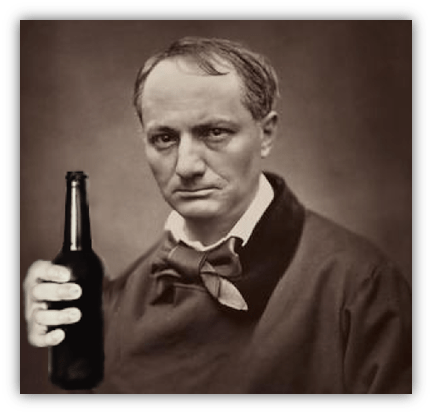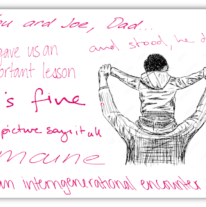You have to be always drunk.
That’s all there is to it – it’s the only way.
So as not to feel the horrible burden of time that breaks your back and bends you to the earth, you have to be continually drunk.
But on what? Wine, poetry or virtue, as you wish.
But be drunk.
“Be Drunk” – Charles Baudelaire,1869
In 1888, Frederich Nietzsche dissed the French poet Charles Baudelaire, writing that his poems were “a type of Wagner without music.”
Wagner, of course, was shorthand for “modern decadence and nihilism put to music.” So take out the music, and you have an art of pure decadence.
And he sure had a point.

Baudelaire was infamous across Europe for poetry that was morbid, despairing, and proudly debauched.
When he published his works in 1857, six of them were condemned from publication, including a hymn to Satan.
While Wagner never made anything so openly ghoulish, he and Baudelaire were mutual fans of one another. To them, existence was full of suffering, and the best one could do was try to numb the pain.
Baudelaire’s poems eventually inspired a wave of like minded poets, painters, and playwrights in the late 19th century to flood the culture with art that was decidedly, and sometimes outlandishly, dark and depraved.
It was an open celebration of decadence.
- You had the so-called “accursed poets” Paul Verlaine and Arthur Rimbaud.

Both known for violent and antisocial tendencies, they wrote poems filled with personal torment, as well as with drinking, drugs, whoring, abuse, blasphemy, and general debasement.
They even co-wrote a poem paying tribute to…the anus.
- You had Alfred Jarry’s loud and nonsensical play “King Ubu.”

Which was banned from the stage after its opening night for its dirty language and an ensuing riot.
- You had Felicien Rops…

… whose most notorious paintings and sketches I can’t post here, as they’re very much NSFW.
If it’s still considered offensive now, imagine how it was seen in the 1880s!
There was even a magazine dedicated to spreading scandalous art, appropriately called Le Decadent.

So why this shift to open debauchery? Why did the nihilism of Baudelaire catch on and spread throughout the avant garde?
Nietzsche argued that the erosion of religious belief in society would eventually lead to the collapse of European morality.
I think this trend was beginning to bear out, though at this point it was limited to small bands of artists within the cosmopolitan elite.
It could also relate to the perceived end of an era. Verlaine himself seemed to think so. Here’s one famous passage he wrote:

Many so-called Decadent artists of the time used imagery from the fall of Rome in their work, expecting a similar collapse of the old order. They yearned for it, as they assumed that the institutions of authority were corrupt and hypocritical, mere shells of what they claimed to be. Given how repressive social mores were in 19th century Europe, there was some validity to that critique.
Still, let’s not get carried away with the nihilism argument, or even decadence.
Their transgressive side could be rather extreme, but there’s more to a lot of these artists than meets the womb…and the tomb!
In 1886, Jean Moreas wrote a manifesto for the artists known as Symbolists, to distinguish themselves from the Decadents. The two movements were more similar than they were different, but the primary significance of the separation is that artists often labeled as “Decadents” wanted to make clear that they were doing something more substantial than mere shock and cynicism.

Khnopff, 1891
Recall that the Romantic artists focused their energy on imagination and irrational passions, while the Realist painters limited their focus to everyday life in the material world.
To some extent, Baudelaire and the later Symbolists were reviving Romanticism after Realism had taken over, hence the heavy reliance on strong emotion and a fascination with the supernatural. But in truth, what they were doing was more of a fusion of the two earlier movements.
Like the Romantics, these new artists readily utilized symbolic associations in their work (hence the name). But like the Realists, the Symbolists trafficked in ambiguous meaning, and so they did not make their symbols simple or clear. All the better to conjure a sense of mystery, to excite the imaginations of their audience.
Also like the Realists: the Symbolists put plenty of focus on the everyday material world.
Baudelaire was a good friend of Realist pioneer Gustave Courbet, and like Courbet he often played the role of observer.*
Walter Benjamin noted that many of Baudelaire’s poems in fact reflect the man’s everyday experience in the city: walking through the dirty streets, passing by faces in a crowd, encountering rogues and ruffians.

The Romantics wrote about nature to escape their industrial nightmare; Baudelaire just documented his impressions of it. His work is just as much a historical snapshot of a rapidly modernizing Paris as it is a mystical journey into his anguished soul.
Anguish and other dark colors were never the whole of the palette, anyway. Verlaine, Rimbaud, Mallarme, Valery, and others all have many poems that focus on beauty, on love, on longing.

Verlaine and Mallarme wrote their verses in language that was itself beautiful. Baudelaire wanted to define beauty as he saw it, choosing ragpickers and whores as the heroes of his time.
Rimbaud pursued his own beauty by defying conventional standards for poetic verses, and made something close to modern poetry in the process.
Rimbaud pursued his own beauty by defying conventional standards for poetic verses, and made something close to modern poetry in the process.
So Nietzshe wasn’t wrong about the nihilism of this sort of art, but he was missing a lot. There’s darkness and despair, but also delight, and documentation. There’s mysticism and mystery. A love of life and a fascination with death. Walking contradiction? Maybe. But to me it just seems like they gave both Logos and anti-Logos a place in their art. Nietzsche himself framed the duality as Apollonian vs Dionysian impulses, while William Blake wrote it as Jesus vs Satan.
And yet, quoth Baudelaire: “Whether you come from heaven or hell, what does it matter, O Beauty!”
Heck, I’ll drink to that!
* Anyone interested in how decadent Gustave Courbet could be should check out his painting “The Origin of the World.” It was completed in 1866, yet would not be shown publicly until 1988. NSFW, obviously.
Let the author know that you liked their article with a “Green Thumb” Upvote!





Whether as escape or as mindshift, I think, each of us has times where we just have to move away, consciously, from the routines and structures that guide our lives. Fortunately, we can look to the arts to find our own muses. At the same time, as a society, we tend to punish these same people for taking risks and making us see what we would rather not (or would but are afraid to). Thanks for continuing to bring their work into the light, my friend.
Agreed, and thanks!
Yeah, the embrace of hedonism can be liberating for a culture, especially for those that are stifled by repression, such as 19th century Europe, and 1950s white America.
But such a shift can have its drawbacks, and one was the empowerment of certain troubled individuals to follow their whims in pursuit of their genius. Some of those people engaged in nasty behavior; their definition of liberty came at the expense of everyone around them. Verlaine and Rimbaud deserve some amount of pity, but they could be real creeps.
With the avant garde, it happened on the sidelines. Once rock n roll rebellion proved to be a lucrative cash cow for the entertainment industry, such bad behavior unfortunately became a regular byproduct of the pop culture machine going forward.
And yet, as you say, the artistic snapshots of individuals working out their struggles can help us in the public to recognize and work out our own.
Not to mention, art can help us see the humanity in people we want to think of as monsters. Even the people who are almost objectively scumbags.
Though one of our more recent troubled pop-artists-turned-creep gave us a potent counterpoint to such magnanimity: “Baby, I got a plan: Run away fast as you can.”
Shout out to Diamanda Galas for her terrifically OTT performance of “The Litanies of Satan” in the original French.
And also to William Shatner, who decided to tie one of Baudelaire’s “Spleen” poems to one of the most famous pop songs of his day:
https://www.youtube.com/watch?v=5d1u5NYXFKo
Sounds like a self-fulfilling prophecy. How much of this philosophy is an excuse to behave decandently? If someone wanted to drink and carouse, could they conveniently point to the collapse of religion as the reason? “It’s not me, it’s the rest of y’all.”
Asking for a friend and have absolutely no decadent plans for next weekend.
It certainly was a self-fulfilling prophecy for the Decadent and Symbolist folks! Nietzsche himself was a killjoy though. Not invited to the cool parties.
It’s an argument that makes sense from a broad sociological standpoint, but makes a lot less sense in any one person’s life, especially in the 19th century, when modernity was only just starting to emerge. As we shall see soon enough, religion and tradition were going strong in plenty of places in the world, even as they were adapting to modern times.
Fascinating as ever. Lots of names that I’m familiar with without knowing the real detail as to what made them such influential historical figures. I’ll drink to being inebriated on knowledge!
Timely article.
The writers and actors aren’t seeing the bigger picture. They better get their projects off and running, stat!
I visited the Arrow Films website last night. Were Nietzsche a contemporary film critic, he, perhaps, would say: Herschel Gordon Lewis is Dario Argento without the music.
Some of the Arrow titles are pretty depraved-sounding. Zombie For Sale is not high on my list for expedient purchase, but I wouldn’t categorically rule it out.
I want the choice to buy it.
This article speaks to me, Phylum.
Like a bullhorn.
So that’s who Baudelaire is. I feel I’ve heard the name plenty over the years, but no idea who the person was.
As for Courbet, I recognized the Disturbed Man picture. As for the Origin of the World…. yeah, okay. 🫣 To his credit, it is quite realistic, ha!
I dunno, I think the Vikings from a millenia ago had them all beat when it comes to realistic poetry. The more graphic and violent, with lots of drinking, the better. It’s like if Klingons decided to have open mic thea-turh night.
Enjoying this journey Phylum, keep em coming!!
Baudelaire gets as guttural as a Frenchman can possibly get, but yeah, you just can’t compete with the Vikings.
Still, this stuff is at least banshee-friendly:
https://www.youtube.com/watch?v=OJpfhuYby2E
Say whaaaat?!!
When would someone play that? I’m sorry, but if I’m invited to dinner where this is the ‘background noise’, I’m doing a 180 at the front door and calling a priest to come pick me up in his Holy Water Uber Boat.
And lord help us if that suddenly gets piped through the speakers while I’m getting meds at CVS….
Come on! What if some tasty Japanese food is thrown into the mix??
“A Catholic Priest and a Buddhist Monk walk into the Phylum Household.
The priest says “I believe Satan is trying to provoke us; there is a sense of doom and great evil thick in the air. My friend, it’s going to take both of us performing at our limits.”
The monk says – ‘what are you talking about? Have you tried this tempura? Forget it, I’m not sharing.’
[Slow claps from the unamused audience, scattered shouts of ‘YOU SUCK!’]
As with obnoxious music, any shame one might have with a bad joke is tempura-ry.